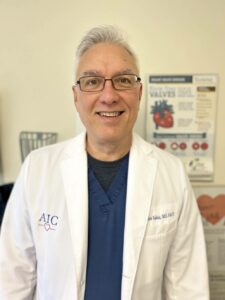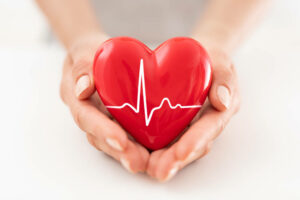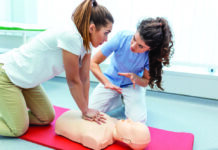
Ellen Braunstein
Considering that it’s responsible for pumping blood and delivering essential nutrients and oxygen to all parts of the body, heart health should be a priority for everyone.
Dr. Peter Sabia, a cardiologist in Silver Spring, Maryland, said that maintaining a healthy heart is crucial for overall well-being and longevity.
Heart disease remains one of the leading causes of death worldwide. In the United States, 20.5 million adults have coronary heart disease and 6-7 million have heart failure. It is the leading cause of death in the U.S. since 1950. In 2021, almost 700,000 Americans died of heart disease.
The most common risk factors are hypertension or high blood pressure, cholesterol, diabetes, smoking, obesity, stress, inactivity and excess alcohol, Sabia said. Risk factors that can’t be modified are family history and gender.
Recommended is a balanced diet that is low in saturated fats, sodium and cholesterol and high in fruits, vegetables and whole grains.
Of all the healthy diet recommendations for heart disease, Sabia had one important suggestion: Eliminate salt.
“The biggest dietary factor that impacts heart health is salt intake,” he said. “Most of the foods we eat are high in sodium content: bread, pizza, cold cuts, fast food.”
With high cholesterol, you can develop fatty deposits in your blood vessels. Eventually, these deposits grow, making it difficult for enough blood to flow through your arteries. Sometimes, those deposits can break suddenly and form a clot that causes a heart attack or stroke.

There are 86 million people, including children, in the U.S. that have elevated levels of cholesterol higher than 200 milligrams per deciliter, or mg/dl. Seven percent of children and adolescents have high cholesterol, he said.
High blood pressure or hypertension damages arteries that can become blocked and prevent blood flow to the heart muscle.
In the U.S., 119 million people have hypertension, which is defined as blood pressure greater than 130/80. “Unfortunately, of the people that have hypertension, only 25% of them have their blood pressure under control,” Sabia said.
“This isn’t something that you take a medicine for and it works forever and perfectly,” Sabia said. “You need to be monitored to make sure you’re on the right dose and it’s effective and not have any side effects.”
People might not take their medicine because high blood pressure and cholesterol are asymptomatic, Sabia said. “You can have high blood pressure and feel normal. The problem is prolonged periods of high blood pressure lead not only to heart disease and heart failure but also increase your risk of stroke. It can become a bigger concern as we get older and can lead to kidney failure.”
There is an epidemic of diabetes that leads to vascular disease and heart disease, he said.
Smoking is not only a risk factor for cancer, but it’s a major risk factor for coronary disease, heart attacks, stroke and peripheral vascular disease, Sabia said.

Stress can raise blood pressure and heart rate.
“Exercise, yoga and meditation are probably some of the best ways to deal with stress,” Sabia said.
The recommended amount of moderate exercise is a minimum of 30 minutes, five times a week.
“Even if you don’t lose weight, you get a cardiovascular benefit from exercise.”
Alcohol can be a risk factor, but it depends on how much you consume.
“There has been a lot of data that low-level consumption may be beneficial, maybe one drink a day for a female and not more than two drinks a day for a male,” he said. “If you are consuming more than that, there certainly are cardiac side effects. Alcohol can precipitate some irregular heart rhythms like atrial fibrillation.”
A warning sign of a heart attack is chest discomfort.
“It’s usually described by people as a tightness, constriction or fullness in their chest that has some duration to it,” Sabia said. “What brings it on is physical activity like walking, climbing steps or carrying something.”
Other symptoms to watch out for are shortness of breath, nausea, sweating, dizziness and fainting.
“We say that anybody that has these symptoms, and they are worried that it could be related to heart disease, should get them checked out,” he said.
There have been new advances in the early detection of heart disease such as coronary calcium scores.
“We’ve used stress tests to detect heart disease and heart blockages, but what many people want to know is do they have blockages to a lesser degree,” Sabia said. “Do I need to work on things to prevent progression to severe blockages and heart attacks? That’s where a test like a coronary calcium score can be very helpful.”
In the past two years, medicines that were developed predominately for diabetes are now standard medicines for heart failure even in patients that don’t have diabetes.
“There is no cookie-cutter way that every patient with heart failure, coronary disease, arrhythmia, vascular disease can be treated,” Sabia said. “But if you discuss this with your physician, they can tailor a program for you.”
Ellen Braunstein is a freelance writer.






